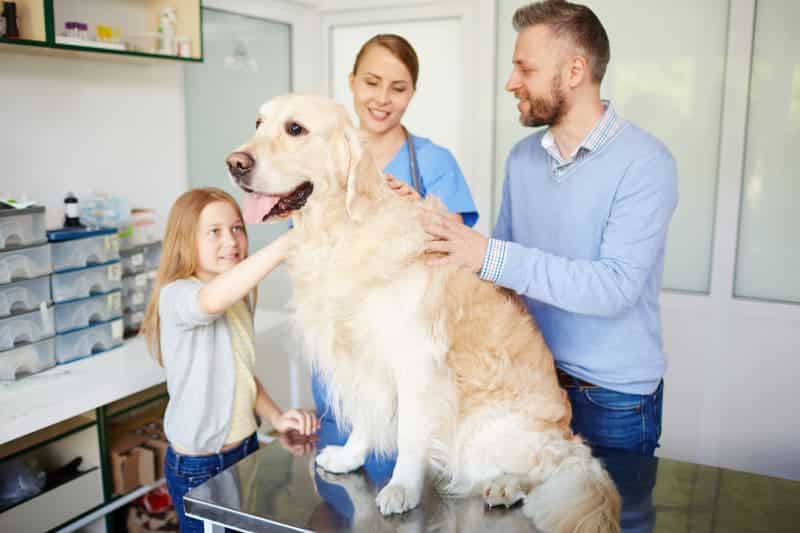Pet Insurance
Find the right pet insurance provider for your budget and your furry friend with detailed reviews, rankings and guides.
Pet Insurance Basics
If you want to know that you can always provide your pet with the best unplanned veterinary care without worrying about financial repercussions, pet insurance can provide that reassurance. However, before you enroll your dog or cat, there are a few basics you should understand.
Typical Pet Insurance Coverage
Standard pet insurance plans cover unexpected veterinary care for your dog or cat. Most plans fall under one of two categories — accident and illness and accident-only. Accident and illness coverage includes diagnostics, tests and treatments related to specific accidents, injuries and illnesses. Accident-only coverage includes treatments for accidents and injuries but excludes any care related to illnesses, diseases or other conditions.
Both types of pet insurance exclude routine care and pre-existing conditions. However, many providers offer a pet wellness add-on that covers routine and preventative care. This coverage is not insurance and typically includes an annual allowance for various items like vaccinations, fixing, bloodwork and more.
How Claims Work
Unlike human health insurance, pet health insurance claims are considered, approved and paid out retroactively. That means you authorize care for your pet from any licensed veterinarian and submit a claim for reimbursement by your provider. If the care is covered, your provider pays you directly for up to a certain percentage (typically between 50%–90%) of the payments you made out of pocket to the vet clinic.
Pre-Existing Conditions and Other Exclusions
It’s important to understand that no pet insurer will cover pre-existing conditions. If your pet suffered an accident or illness prior to enrollment, they’re considered pre-existing conditions and excluded from your plan. For example, if your pet has previously been diagnosed with kidney stones, any care for future kidney stones won’t be covered. Similarly, if your pet has a history of swallowing foreign objects, this type of accident won’t be covered.
Many policies also have typical exclusions, such as dental disease, behavioral issues, hip dysplasia, and grooming, so be sure to read and understand a provider’s sample policy before purchasing.
Waiting Periods
After enrolling your pet in your chosen plan, waiting periods begin. A waiting period is a length of time during which accidents or illnesses are considered pre-existing and not covered. Typical waiting periods are two days for accidents, 14 days for illnesses and six months for cruciate ligament events.
Get started with our comprehensive guide to the best pet insurance companies.
LATEST ARTICLES
Find out whether Chewy’s pet insurance is right for you based on its coverages, costs, deductibles and other important policy information.
Suggested Articles
- The Best Pet Insurance Companies (April 2024)
- The Cheapest Pet Insurance Companies (April 2024)
- Pet Dental Insurance: Coverage and Cost Guide
- Best Pet Wellness Plans for Routine Care (2024)
- Emergency Pet Insurance: Coverage for Urgent Veterinary Care (2024)
- The Best Pet Insurance for Multiple Pets (2024)
- Does Pet Insurance Cover Spaying and Neutering?
- Best Pet Insurance That Covers Curable Pre-Existing Conditions
- Exotic Pet Insurance: What You Need To Know
- Is There Pet Insurance With No Waiting Periods?
- The Best Pet Insurance for Older Dogs (2024)
- Best Pet Insurance for French Bulldogs (2024)
- Pet Insurance For Rescue Dogs (Adopted Pet Guide)
- Best Pet Insurance for German Shepherds (2024)
- The Best Pet Insurance for Horses (2024)
- Pet Insurance For Breeders: What You Need To Know (2024)
- Best Pet Insurance Companies in Canada (April 2024)
- Best Pet Insurance That Covers Hip Dysplasia
- Pet Insurance That Pays Vets Directly (2024)
- The Best Pet Insurance Companies in Alabama (2024)
- The Best Pet Insurance Companies in Alaska (2024)
- The Best Pet Insurance Companies in Arizona (2024)
- The Best Pet Insurance Companies in Arkansas (2024)
- The Best Pet Insurance in California (April 2024)
- The Best Pet Insurance Companies in Colorado (2024)
- Best Pet Insurance Companies in Connecticut (2024)
- The Best Pet Insurance Companies in Delaware (2024)
- The Best Pet Insurance Companies in Washington, D.C. (2024)
- The Best Pet Insurance in Florida (2024)
- The Best Pet Insurance Companies in Georgia (2024)
- The Best Pet Insurance Companies in Hawaii (2024)
- The Best Pet Insurance Companies in Idaho (2024)
- The Best Pet Insurance Companies in Illinois (2024)
- The Best Pet Insurance Companies in Indiana (2024)
- The Best Pet Insurance Companies in Iowa (2024)
- 7 Best Pet Insurance Companies in Kansas (2024)
- The Best Pet Insurance Companies in Kentucky (2024)
- The Best Pet Insurance Companies in Louisiana (2024)
- The Best Pet Insurance Companies in Maine (2024)
- The Best Pet Insurance Companies in Maryland (2024)
- The Best Pet Insurance Companies in Massachusetts (2024)
- The Best Pet Insurance Companies in Michigan (2024)
- The Best Pet Insurance Companies in Minnesota (2024)
- The Best Pet Insurance Companies in Mississippi (2024)
- The Best Pet Insurance Companies in Missouri (2024)
- The Best Pet Insurance Companies in Montana (2024)
- The Best Pet Insurance Companies in Nebraska (2024)
- The Best Pet Insurance Companies in Nevada (2024)
- The Best Pet Insurance Companies in New Hampshire (2024)
- The Best Pet Insurance in New Jersey (2024)
- The Best Pet Insurance Companies in New Mexico (2024)
- The Best Pet Insurance Companies in New York (2024)
- The Best Pet Insurance Companies in North Carolina (2024)
- The Best Pet Insurance Companies in North Dakota (2024)
- The Best Pet Insurance in Ohio (2024)
- The Best Pet Insurance Companies in Oklahoma (2024)
- The Best Pet Insurance in Oregon (2024)
- The Best Pet Insurance Companies in Pennsylvania (2024)
- The Best Pet Insurance Companies in Rhode Island (2024)
- The Best Pet Insurance Companies in South Carolina (2024)
- The Best Pet Insurance Companies in South Dakota (2024)
- The Best Pet Insurance Companies in Tennessee (2024)
- The Best Pet Insurance in Texas (2024)
- The Best Pet Insurance Companies in Utah (2024)
- The Best Pet Insurance Companies in Vermont (2024)
- The Best Pet Insurance Companies in Virginia (2024)
- Best Pet Insurance Companies in Washington State (2024)
- The Best Pet Insurance Companies in West Virginia (2024)
- The Best Pet Insurance Companies in Wisconsin (2024)
- The Best Pet Insurance Companies in Wyoming (2024)
- How Much Does Pet Insurance Cost? (April 2024)
- How Much Does a Vet Visit Cost?
- Dog Cataract Surgery Cost (2024 Guide)
- How Much Do Vet X-Rays Cost? (2024)
- The Cost of Owning a Dog: Annual and Lifetime Costs
- How Much Does It Cost to Microchip a Dog?
- Parvo Shots Cost (2024 Guide)
- French Bulldog Cost: 2024 Guide
- How Much Does Cherry Eye Surgery Cost? (2024)
- How Much Does Dog Blood Work Cost? (2024)
- How Much Does a Dog Cesarean Section Cost? (2024)
- How Much Does Dog Lipoma Removal Cost?
- How Much Does It Cost To Sedate a Dog?
- How Much Does Dog Teeth Cleaning Cost?
- How Much Do Dog Vaccinations Cost?
- How Much Does the Lepto Vaccine for Dogs Cost? (2024 Guide)
- What To Know About Pancreatitis in Dogs and Treatment Cost
- How Much Does Pyometra Dog Surgery Cost?
- AAA Pet Insurance Review (2024)
- AKC Pet Insurance Review and Costs (2024)
- Allstate Pet Insurance Review and Pricing (2024)
- ASPCA Pet Health Insurance Review and Pricing (2024)
- Banfield Optimum Wellness Plan Review and Cost (2024)
- Bivvy Pet Insurance Review 2024 | Coverage and Cost
- Companion Protect Review (2024)
- Costco Pet Insurance Review & Pricing (2024)
- Embrace Pet Insurance Review and Pricing (2024)
- Farmers Pet Insurance Review and Pricing (2024)
- Fetch Pet Insurance Review and Pricing (2024)
- Figo Pet Insurance Review and Pricing (2024)
- Geico Pet Insurance Review (2024)
- Hartville Pet Insurance Review (2024)
- Healthy Paws Pet Insurance Review & Pricing (2024)
- Lemonade Pet Insurance Review & Costs (2024)
- Liberty Mutual Pet Insurance Review (2024)
- ManyPets Pet Insurance Review and Pricing (2024)
- MetLife Pet Insurance Review and Pricing (2024)
- Nationwide Pet Insurance Review (2024)
- Odie Pet Insurance Review (2024)
- Pawp Review and Pricing (2024)
- Pet Assure Pet Insurance Review (2024)
- Petco Pet Insurnace Review (2024)
- PetFirst Pet Insurance Review (2024)
- Pets Best Pet Insurance Review (2024)
- Progressive Pet Insurance Review (2024)
- Prudent Pet Insurance Review of 2024
- Pumpkin Pet Insurance Review and Cost (2024)
- Spot Pet Insurance Review & Pricing (2024)
- State Farm Pet Insurance Review and Pricing (2024)
- Travelers Pet Insurance Review (2024)
- 24PetWatch Pet Insurance Review (2024)
- Does Pet Insurance Cover ACL Surgery?
- Does Pet Insurance Cover Surgery?
- Does Pet Insurance Cover Training?
- Does Pet Insurance Cover Prescription Food?
- Does Pet Insurance Cover Vaccinations?
- Does Pet Insurance Cover Medication?
- Best Pet Insurance That Covers Hip Dysplasia
- Does Pet Insurance Cover Cancer Treatment?
- Does Pet Insurance Cover Putting a Pet to Sleep?
- Does Pet Insurance Cover Fleas and Ticks?
- Does Pet Insurance Cover Parvo?
- Embrace vs. Trupanion Pet Insurance: 2024 Comparison
- Figo vs. Healthy Paws Pet Insurance: 2024 Comparison
- Fetch vs. Healthy Paws Pet Insurance: 2024 Comparison
- Healthy Paws vs. Trupanion: 2024 Comparison
- Healthy Paws vs. Nationwide Pet Insurance: 2024 Comparison
- Healthy Paws vs. Embrace (2024 Comparison)
- Lemonade vs. Healthy Paws Pet Insurance: 2024 Comparison
- Pets Best vs. Healthy Paws: 2024 Comparison
- Lemonade vs. Pumpkin Pet Insurance: 2024 Comparison
- Lemonade vs. Trupanion Pet Insurance: 2024 Comparison
- Trupanion vs. Pets Best: 2024 Comparison
- Trupanion vs. Nationwide Pet Insurance: 2024 Comparison
- Can You Cancel Pet Insurance at Any Time?
- Do All Vets Take Pet Insurance?
- What Is Pet Insurance and How Does It Work?
- How Often Should I Take My Dog to the Vet?
- Is Pet Insurance Worth It? Veterinarians say YES!
- Pet Insurance vs. Pet Savings Account: Which Is the Best Option? (2024)
- Is There Pet Insurance With No Waiting Periods?
- What Does Pet Insurance Cover? (2024)
- What Is a Good Annual Limit for Pet Insurance? (2024)
- What Is a Pet Insurance Deductible?
- What Is Pet Insurance?
- Top Pet Insurance Facts and Statistics of 2024
- Top 2024 Pet Ownership Statistics and Facts
- Cost of Owning a Dog in Every State (2023 Study)
- The Cost of Owning a Dog: Annual and Lifetime Costs
- These Are America’s Dog-Friendliest Cities, Study Finds (2024)
- Most and Least Expensive Dog Breeds
- 2024 Pet Insurance Survey: Fearing Costs, 30% of Pet Owners Have Avoided the Vet
- Pet Spending Trends of 2024: Older Americans Spend More on Pets
- State-by-State Financial Aid Programs for Pets (2024)
- Holiday Safety Tips For Pets














































